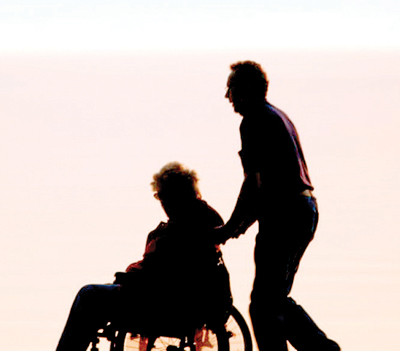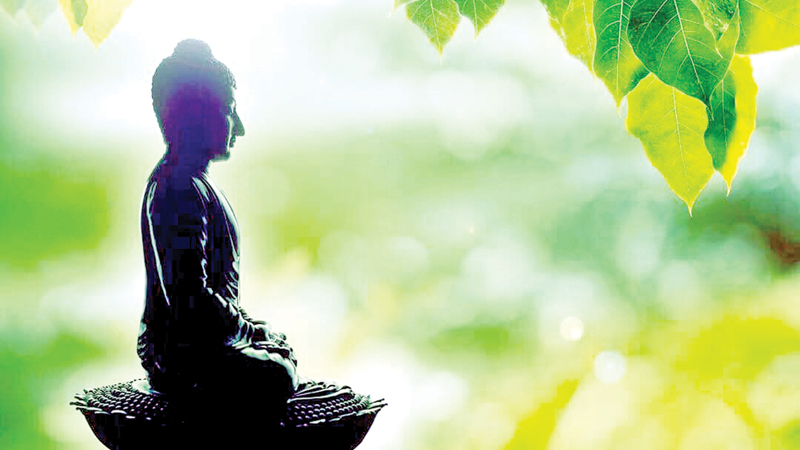“The Dhamma teaches us to be grateful to our benefactors” – By Thānissaro Bhikkhu
– Reproduced below is a Dhamma talk delivered by the Most Ven. Cariya Mah Boowa on March 17, 1975.
All of us sitting here – and this includes the adults as well as the children – should not forget that we each have a mother and father who gave us birth and have provided for our needs. When we were first born we weren’t even able to know whether we were human beings or what, so we had to depend on our parents to look after us.
They cared for us from the time we were in the womb until we came out into the world, and from that point on they kept caring for us and watching over us. As soon as we were old enough to start our education, they sent us to school and provided for all our related needs. From the beginning of our schooling to the end, how much did it cost them?
The books, pencils, paper, clothing, sports equipment, tuition, and all the other items too numerous to name – all of these things were a responsibility our parents had to shoulder. When we came into the world, we came without a thing to our names. Even our own bodies and every aspect of our lives came from our parents and were watched over by them.
Growth and safety
They provided for our growth and safety, teaching us to know all sorts of things. We ourselves had nothing to show off to them aside from our eating and playing and crying and whining and pestering them in various ways as we felt like it. There was nothing of any worth to us at all except for the fact that we happened to qualify as people like the rest of the human world.
Children at this age are in the stage where they’re really bothersome at all hours of the day. Their bodies may be small and very endearing, but the trouble they cause isn’t small like their bodies at all. Everything that happens to us at this age is an enormous issue – until we get old enough to know what’s what and start our education.
 Even then we still can’t help causing trouble for our parents over things like clothing and so on, but at least we begin to gain knowledge, starting with the ABC’s and on through elementary school, high school, university, and graduate school, until we finally count as educated. So, in keeping with the fact that we’re educated, we shouldn’t forget the kindness of our parents who cared and provided for us before anyone else in the world. And we shouldn’t forget our teachers and other benefactors. We should always keep their kindness in mind – because everything we have in body and mind has come from the care, protection, and teachings of our parents and teachers.
Even then we still can’t help causing trouble for our parents over things like clothing and so on, but at least we begin to gain knowledge, starting with the ABC’s and on through elementary school, high school, university, and graduate school, until we finally count as educated. So, in keeping with the fact that we’re educated, we shouldn’t forget the kindness of our parents who cared and provided for us before anyone else in the world. And we shouldn’t forget our teachers and other benefactors. We should always keep their kindness in mind – because everything we have in body and mind has come from the care, protection, and teachings of our parents and teachers.
Those who are ungrateful, who forget the help of their benefactors, those who are selfish, and see only their own knowledge and abilities in the present without showing deference or consideration for their benefactors are a dead-weight on the world and can find no real progress in life – like a dead tree standing with no fruits or leaves to give shade. So I ask that you each take care to remember not to be the sort of person who is like a dead tree of this sort. Otherwise you’ll be an object of disgust for all your good fellow human beings, and will have no value to the day you die. Let me stress once more that we have each come from our parents and have gained knowledge from our teachers.
This is why we shouldn’t forget ourselves and think that we’re smart and self-sufficient. Otherwise, when we make a slip and fall, we won’t be able to pick up the pieces – the pieces of us – which is the worst sort of loss we can experience, especially now that the world is changing faster than anyone can keep up with, because of all sorts of strange and unnatural theories and ideas.
If anyone were to come along and say that the world has gone crazy, he wouldn’t be wrong, and we’d have to admire him for speaking the truth because things you wouldn’t think were possible have come to pass. I’ve been around a fairly long time now, and I’ve come to see things in this present-day world that I’ve never seen before. Students, for example, will at the drop of a hat put their teachers in jail or drive them out of their jobs and create all sorts of havoc, stirring up trouble in places that used to be at peace. At first they seem reasonable and admirable in their ideals, but as time passes they get carried away with themselves, loose sight of their parents and teachers and forget that good adults do exist.
If this keeps up, I’m afraid that young people carried away with theories of this sort will end up throwing their parents in jail on grounds of being old-fashioned, out-of-date and an embarrassment to them in front of their friends. This sort of thing can happen if we don’t come to our senses and correct the situation right now. Don’t let these ‘modern’ ideas bring about the end of the world – for the world these days is spinning towards … it’s hard to say what. I’m afraid the knowledge we’ve gained will become a tool for cruelty and heartlessness, and we’ll end up drowning in it. So I ask that you reflect on things carefully. Our nation and society are things of great value to us, so don’t treat them as tools for your opinions, your urge for the excitement of action, or your desire for fame. If society breaks down, you’ll have no way of restoring it. Buddhism is absolutely right in teaching us the virtue that can prevent all these dangers – the virtue of gratitude to our benefactors. Who are our benefactors? To begin with, our parents, who have cared for us from the day of our birth all the way up to the present.
Sacrifices
There is no one else in this world who would dare make such sacrifices for us, who would love and show us such compassion as our parents. They are the ones whose kindnesses we should bear in mind more than those of anyone else – and yet we hardly ever give them any thought. The fact that we hardly give them any thought is what can make us arrogant and ungrateful as we grow older. We tend to forget how, as children, we used to lord it over them. We forget that every child has held the power to order its parents around in every way in line with its whims, even in ways that aren’t proper. Especially when the child is very young; that’s when it’s very powerful.
The parents have to put up with so many hardships that you really feel sorry for them. They try everything they can to placate the child because of their love for it, because it is flesh of their own flesh, blood of their own blood. If it orders them to be birds, they have to be birds; if crows, they have to be crows, even though they aren’t birds or crows at all. In other words, they have to run around in search of whatever it wants. Otherwise its shrill, small voice will fill the house.
Every child has been the lord of its parents, ordering them around as it likes. As it grows older, its position diminishes from lord to boss and then to supervisor. But as long as it’s still very young, it holds sole absolute authority within the family. Whatever it demands has to come true. Otherwise it’ll cry until its eyes are on fire. So the parents have to scurry around to satisfy its wants. Every child holds the position of lord, boss, and supervisor in the family before its position finally works down to where it’s tolerable. But never will it agree to come down to the same level with its parents. Until the day it is parted from them by death, the child will always have to hold the reins of power.
There is no doubt that all of us here – all of you, and I myself – have held the position of lord of the family, boss of the family, supervisor of the family, and the old habits have stuck so that we continue to take advantage of our parents, even unintentionally, because the principles of nature among parents and their children create this sort of bond. This holds true for everyone all over the world.
So for the sake of what’s noble and right – in keeping with the fact that our parents gave us life and have done us so many kindnesses – we as children shouldn’t abuse our authority or take too many liberties with them, even unintentionally, because to do so doesn’t fit in with the fact that we have lived under the shelter of their many kindnesses. To exercise power, abusing the fact that we are their children, abusing their love and compassion for us, ordering them around and speaking harshly with them – these are grave errors on our part.
Some children argue with their parents in an arrogant way simply because of their greed. They pester their parents to buy them things like their friends’, with no thought at all for the family budget. They want this thing or that, so-and-so much money: a constant turmoil. As for the parents, their hearts are ready to burst. It’s hard enough to raise a child as it is, but even harder when the child never seems to grow up. So I ask that you each consider this carefully. Raising a child is a much heavier burden than raising any number of animals. If there’s anyone who hasn’t experienced any great hardship in life, try raising a child or two and you’ll know what it’s like. Now, in saying this, my purpose isn’t to criticise the children here. I’m just speaking in line with the way things are all over the world. I too have sat on my parents’ heads, urinating and defecating all over them. I doubt that there’s anyone who could match me in this respect.
My purpose in saying these things is simply to give all of us who have used our parents as servants a sense of the wrong we have done them, so that we won’t be proud or arrogant with them, and won’t try to force them to do things that are improper or before the right time has come. No matter how poor our parents may be, they have worked their hardest to provide for us to the best of their ability. All of us gathered here today have been children raised with the utmost hardship by their parents. Don’t think that you’re a deity who floated down from some heavenly mansion and made a spontaneous appearance without anyone to give you birth or care for you.
It’s only through the sufferings and hardships of our parents that we now sit here as adults, students, teachers or whatever. To put it plainly, the fact that we’ve been able to grow is thanks to the hardships and difficulties our parents have borne so patiently. None of our parents have been millionaires with wealth like an ocean – apart from the ocean of love and compassion in their hearts that will never run dry. If we were to keep a record of how much our parents have spent on each of us, we’d be so shocked at the amount that we wouldn’t be able to finish the account.
The money has flowed out in every direction, regardless of the season. But no parents have ever dared keep such a record, because the expenditures have no value for them when compared to their love for their children, who are flesh and blood of their very hearts. Think about it. How many children does each parent have for whom he or she has to make so many sacrifices of so many sorts before the children can grow to the point where they really count as human beings and the parents can relax some of their concern. And then there are the children who never grow up, who keep pestering their parents to the day they die.
So all of us, as our parents’ children, should have a sense of our own indebtedness. Don’t regard yourself as smarter than your parents or superior to them. Their kindness has sheltered you from the moment you first entered the womb up to the present. This is why parents are said to be the Brahmās– the gods – of their children. Their love for their children is love from pure motives. Their compassion, compassion from pure motives. They make all sorts of sacrifices – again, from pure motives. There are no hidden or ulterior motives involved at all.
Compassion
No matter how rich or capable the child becomes, the parents’ compassion and concern never fades. For this reason, children who are ungrateful to the parents who have been so kind to them are destroyed as people – even though they may think they’re advanced. There’s no way they can prosper as human beings with cool virtues in their hearts. Any wealth they may gain is like a fire burning their homes and their hearts at all times, because the evil that comes from destroying the source of one’s life is bound to bear such heavy results that no one else can be of any help. This is an ancient and irrefutable law that has been taught us by sages. If you don’t want to fall into hell in this very life, you should reflect on your parents’ kindness and show them your gratitude. You’ll then be sure to prosper like all other good human beings.
The Dhamma teaches us to be grateful to our benefactors, such as our parents and teachers. Anyone who has cared for us, anyone who has taught us, we should respect and help whenever the occasion calls for it. Don’t be callous, stubborn, or proud of your higher status or education. Always bear your benefactors’ kindnesses in mind. Remember that you are their child, their student. Always think of yourself as beneath them, in the same way that a mountain, no matter how tall, is always beneath the feet of the person who climbs it. No matter how sharp a knife may be, it can’t get that way without a whetstone; no matter how knowledgeable we may be, we couldn’t get that way without our teachers. For this reason, the Buddha teaches us to respect our parents and teachers as the first step in becoming a decent human being.
– Translated by Thānissaro Bhikkhu






